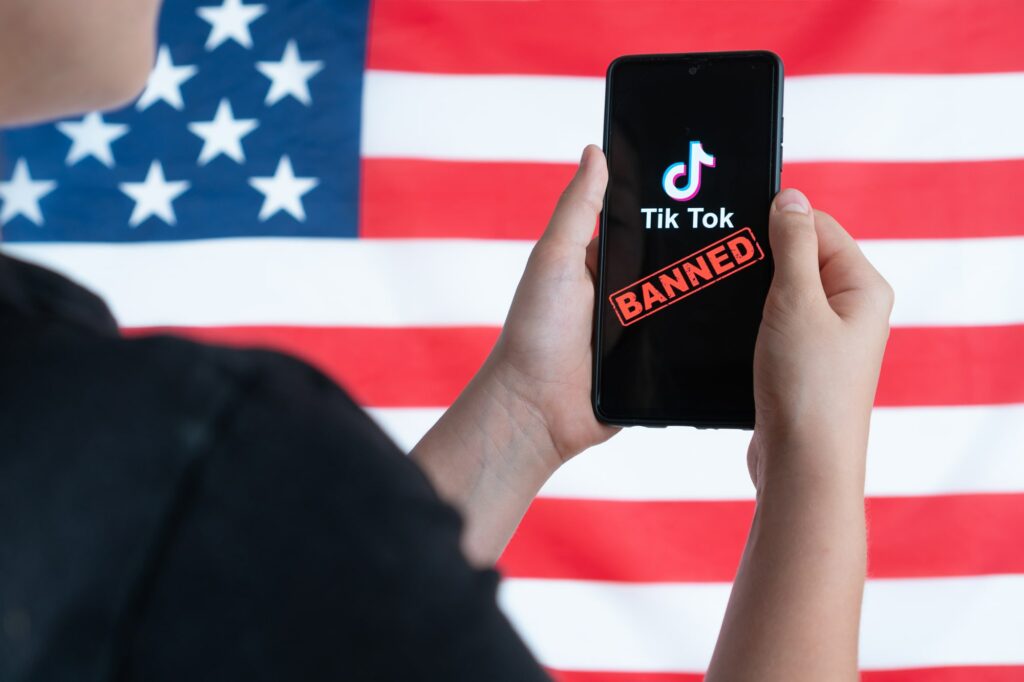The TikTok Ban Breakdown: What’s Next for the World’s Favorite Dance Floor?

With a staggering 1.5 billion monthly active users, TikTok has transcended the realm of a social media app to become a full-fledged cultural phenomenon. Its infectious blend of bite-sized video content, pulsating music, and dynamic editing tools has birthed countless dance crazes, propelled unknown creators to internet stardom, and redefined the way we consume online entertainment.
However, the platform’s meteoric rise has coincided with a growing political firestorm. Recently, the US government passed a funding bill that included provisions for a ban of TikTok if it is not sold to an American firm. And last week, TikTok sued the government to block the ban.
It’s a fluid situation at the moment, but let’s break down the TikTok ban and what might happen next.
The Rise of TikTok: A Recipe for Viral Success
TikTok’s story begins in China, where its predecessor, Douyin, rose to prominence in 2016. In that same year, ByteDance, the parent company of Douyin, acquired the popular American lip-syncing app Musical.ly.
The merger that followed birthed TikTok, a global platform that seamlessly integrated the short-form video format of Douyin with the established user base of Musical.ly.
This fusion proved to be a masterstroke. Unlike traditional social media platforms that prioritize follower count and pre-existing connections, TikTok’s algorithm, dubbed the “For You” page, curates a personalized feed of videos based on user engagement.
This democratization of content exposure allows everyday users, devoid of a massive following, to have their videos seen by millions if their content resonates with the platform’s ever-evolving trends.
This focus on engagement over pre-established social hierarchies birthed a vibrant and dynamic online community where creativity thrives and unknown talents can blossom into viral sensations overnight.
The Looming Ban: National Security Concerns and Content Moderation Challenges
The potential ban on TikTok stems from a confluence of factors, but national security concerns are the main sticking point.
Over the years, the US government has voiced anxieties over the app’s data collection practices – specifically, the possibility of user data being accessed by the Chinese government. This apprehension stems from the fact that ByteDance, TikTok’s parent company, is a Chinese firm – and all Chinese firms have a special relationship to their national government that is rare in the West.
The geopolitical tensions between the US and China further exacerbate these anxieties, and this has led to concerns about potential manipulation of user data or the dissemination of propaganda.
Beyond national security, the sheer volume of user-generated content on TikTok presents a formidable challenge for content moderation. The platform thrives on the constant influx of fresh videos, but this very characteristic makes it a breeding ground for inappropriate and potentially dangerous content. Issues like misinformation, cyberbullying, and content unsuitable for younger audiences raise serious concerns about the platform’s ability to maintain a safe and secure online environment.
The rapid pace at which trends and challenges emerge on TikTok further complicates content moderation efforts, as new forms of potentially harmful content can materialize before adequate safeguards are put in place.
Potential Outcomes: A Domestic Scramble or a Fragmented Social Media Landscape?
So let’s assume that ByteDance doesn’t sell and the TikTok ban ends up happening. What happens next?
If a ban on TikTok materializes, the most likely scenario is a domestic scramble to fill the void.
Existing US-based social media giants, keenly aware of the massive user base currently on TikTok, might scramble to develop their own short-form video platforms. These platforms would likely attempt to replicate the key features that have made TikTok so successful, such as the personalized “For You” page and user-friendly editing tools.
However, replicating the magic of an established platform with a dedicated user base is no easy feat. These new platforms would face the uphill battle of attracting users away from a familiar and well-loved app, and the initial content offering might lack the depth and diversity that thrives on TikTok’s global reach.
Just look at the example of Threads, Meta’s attempt to recapture the magic of Twitter. You’d be hard-pressed to call it a failure, especially after its superb launch week… but it also hasn’t exactly taken over from what is now called X since then.
Alternatively, a more fragmented social media landscape could emerge in the absence of TikTok. Smaller, niche platforms catering to specific interests might rise to prominence.
This scenario, however, could lead to a loss of the global exchange of ideas and trends that TikTok currently fosters. The current iteration of the internet thrives on the interconnectedness of platforms, and a splintered social media landscape could lead to a sense of isolation and a decline in the cross-pollination of creative ideas.
The Enduring Appeal of Short-Form Video
Regardless of the fate of TikTok, the undeniable truth is that short-form video content has captured the attention of the digital generation. Users crave the bite-sized entertainment, humor, and creativity that these platforms offer.
The future of social media might lie in striking a delicate balance between fostering innovation in this rapidly evolving space and addressing critical issues like data security, responsible content creation, and effective content moderation.
Whether it’s through a reformed TikTok or a new generation of platforms, the world’s digital dance floor is likely to keep evolving, offering a stage for self-expression and connection in the ever-changing online world.
Stay Up to Date on the Latest TikTok Ban News with Pink Dog Digital
Pink Dog Digital helps our clients stay up-to-date with the latest news in social media and search engines so they can make informed decisions on their digital strategies.
Our team will leverage our knowledge of engaging content and great SEO to help you optimize your content strategy, identify new opportunities, and stay ahead of the competition. At Pink Dog Digital, we thrive on helping small businesses achieve their digital marketing goals and grow their digital footprint.
For more information, call us at 410-696-3305, email us at pinkdogdigital@gmail.com, or contact us through our website.

